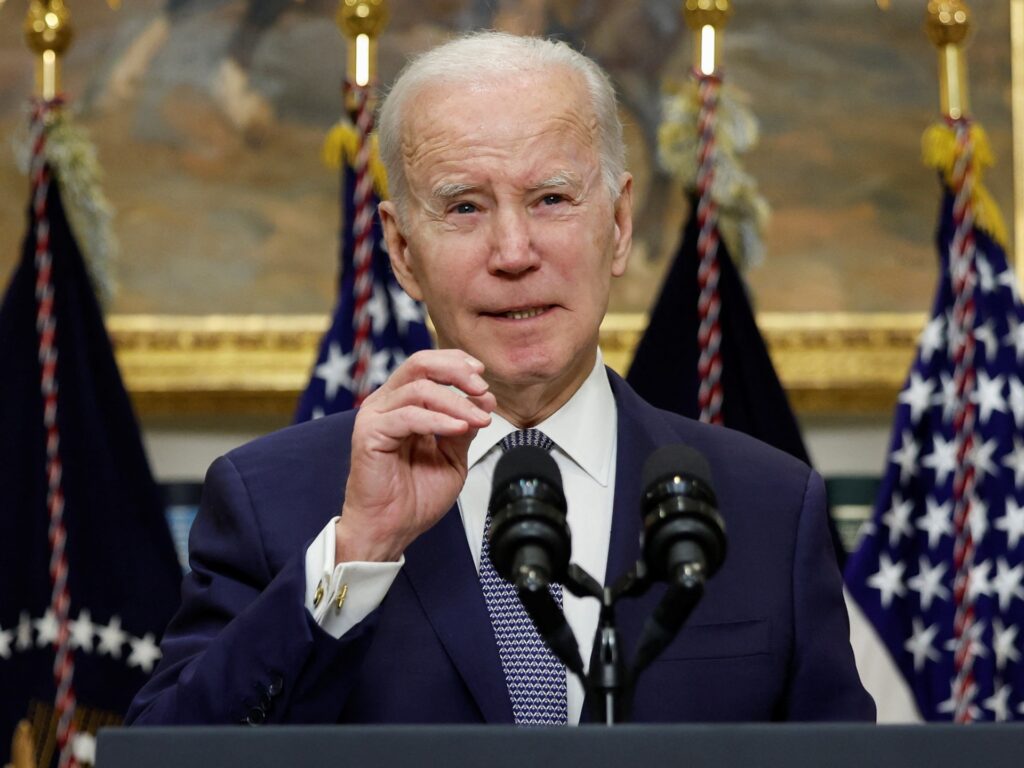Washington, DC – The White House has released a plan to combat the rise of anti-Semitism amid a continuing debate about how to define anti-Jewish hatred, especially as it relates to Israel.
President Joe Biden presented the strategy on Thursday, calling on all people to push back against anti-Semitism.
“In the past several years, hate’s been given too much oxygen, surely in the record rise in anti-Semitism. It’s simply wrong,” Biden said. “It’s immoral. It’s unacceptable. It’s on all of us to stop it.”
The plan called for improving education around anti-Semitism; strengthening safety and security for Jewish communities; reversing the “normalisation” of anti-Semitic discrimination by celebrities and politicians; and building “cross-community solidarity” to counter bigotry.
It cited FBI statistics saying that anti-Semitism drove 63 percent of reported religiously motivated hate crimes, although Jewish Americans account for 2.4 percent of the population.
The definition debate
In its plan, the Biden administration did not adopt the International Holocaust Remembrance Alliance’s (IHRA) working definition of anti-Semitism as its sole framework for understanding anti-Jewish hate — effectively skirting a demand by some pro-Israel groups.
Defining anti-Semitism proved controversial for the White House even before the plan was released. Pro-Israel Jewish groups had urged the IHRA definition, which heavily focuses on Israel.
The IRHA’s definition provided 11 examples of anti-Semitism. Six of them mentioned Israel, including “applying double standards” to Israeli government policies.
While the IHRA document stated that “criticism of Israel similar to that leveled against any other country cannot be regarded as antisemitic”, Palestinian rights advocates said its definition has been used to stifle legitimate debate about Israeli human rights abuses.
In one of its examples, the IHRA definition denounced claims “that the existence of a State of Israel is a racist endeavor”. But critics have argued that this limitation has been used by Israel’s defenders to censor discussions about the mass displacement of Palestinians during the country’s establishment in 1948.
As a result, progressives — including some US Jewish organisations — urged the Biden administration not to adopt the IHRA definition in its plan to address anti-Semitism.
On Thursday, the White House tip-toed around the issue. It said the US “embraced” the IHRA document but acknowledged that there are other definitions of anti-Semitism.
It also paid a nod to the Nexus Document, drafted by a task force formerly at the University of Southern California, which states even “harsh criticism of Israel for its policies and actions” is not necessarily anti-Semitic.
“There are several definitions of antisemitism, which serve as valuable tools to raise awareness and increase understanding of antisemitism,” the Biden administration’s strategy statement read.
“The most prominent is the non-legally binding ‘working definition’ of antisemitism adopted in 2016 by the 31-member states of the International Holocaust Remembrance Alliance (IHRA), which the United States has embraced. In addition, the Administration welcomes and appreciates the Nexus Document and notes other such efforts.”
Today, my Administration is releasing a national strategy to fight antisemitism.
Together, we’ll raise awareness of antisemitism and Jewish American Heritage, improve safety, reverse the normalization of hate, counter discrimination, and build solidarity and collective action.
— President Biden (@POTUS) May 25, 2023
The language seemed to please both sides of the debate.
Americans for Peace Now, a progressive US Jewish organisation, lauded the plan and thanked Biden for “not succumbing to those who demanded the codification of the IHRA definition so that they could use false accusations of antisemitism to attack those who criticize indefensible Israeli policies”.
At the same time, the Anti-Defamation League (ADL), a staunchly pro-Israel group, “welcomed the adoption of the International Holocaust Remembrance Alliance (IHRA) definition of antisemitism as part of the plan”.
J Street, a Jewish-American liberal group that describes itself as pro-Israel and pro-peace, also applauded the plan, calling it “comprehensive, inclusive and focused on action to dismantle the machinery of division and hate”.
“Importantly, the strategy avoids exclusively codifying any one specific, sweeping definition of antisemitism as the sole standard for use in enforcing domestic law and policy, recognizing that such an approach could do more harm than good,” J Street said in a statement.
On Israel
Palestinian rights supporters have long argued that pro-Israel advocates often “weaponise” allegations of anti-Semitism to shield Israel from criticism.
Leading human rights groups, including Amnesty International and Human Rights Watch, have accused Israel of imposing apartheid on Palestinians.
Thursday’s plan made several references to Israel. “When Jews are targeted because of their beliefs or their identity, when Israel is singled out because of anti-Jewish hatred, that is antisemitism. And that is unacceptable,” it said.
The document also suggested that the US will support Israel at international organisations as part of countering anti-Semitism.
Washington has used its veto powers at the United Nations Security Council dozens of times to block resolutions calling out Israeli abuses and violations of international law.
The Biden administration, like its predecessors, has also pushed back against Palestinians’ efforts to seek accountability for possible Israeli war crimes at the International Criminal Court (ICC).
“The US Government, led by the Department of State, will continue to combat antisemitism abroad and in international fora — including efforts to delegitimize the State of Israel,” the plan said.
Abed Ayoub, executive director of the American-Arab Anti-Discrimination Committee (ADC), a US-based advocacy group, lauded efforts to combat anti-Semitism and bigotry of all forms. He said his group also welcomed the White House’s reluctance to officially adopt the IHRA definition.
“It is a definition and an approach that’s been used to target and silence our community,” Ayoub told Al Jazeera. “And we’re glad that they didn’t officially adopt it or try to make it legally binding in any way.”
Still, he raised concern about language in the plan that he said conflated criticism of Israel with anti-Semtism.
“That is a dangerous precedent and a dangerous approach for the administration to take,” he said. “Criticising Israel is not anti-Semitism, and that needs to be reflected in all training, and that needs to be reflected across the board.”


